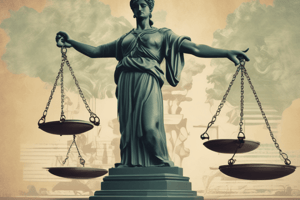Podcast
Questions and Answers
What is the sequence of numerical identifiers following the letter 'B'?
What is the sequence of numerical identifiers following the letter 'B'?
- 6, 7, 8, 9 (correct)
- 1, 2, 3, 4
- 10, 11, 12, 13
- 7, 8, 9, 10
Which letter is consistently followed by subdivision numbers?
Which letter is consistently followed by subdivision numbers?
- B
- A (correct)
- C
- D
Which of the following sequences contains a letter and two digits before it?
Which of the following sequences contains a letter and two digits before it?
- 3.a.i.b.2
- xxvi.5.viii.A (correct)
- cxxxvi.123.x.x
- xii.xiii.k.4
What is the highest numerical identifier found before the letter 'd'?
What is the highest numerical identifier found before the letter 'd'?
Which letter and number combination does not exist in the sequence?
Which letter and number combination does not exist in the sequence?
Which of the following identifiers appears to have the highest hierarchical importance?
Which of the following identifiers appears to have the highest hierarchical importance?
How many distinct sections appear to be indicated by numbers after the letter 'c'?
How many distinct sections appear to be indicated by numbers after the letter 'c'?
Which sequence shows an identifier that is consistently in the form of a lowercase letter followed by a number?
Which sequence shows an identifier that is consistently in the form of a lowercase letter followed by a number?
Flashcards
Hierarchical numbering system
Hierarchical numbering system
A system using multiple levels of numbers to organize complex information.
Sequential numbering
Sequential numbering
Numbers following each other in a specific order.
Complex organizational structure
Complex organizational structure
A structure of information with intricate relationships between parts, employing both hierarchical and sequential numbers.
Alpha-numeric labels
Alpha-numeric labels
Signup and view all the flashcards
Nested lists
Nested lists
Signup and view all the flashcards
Roman numerals
Roman numerals
Signup and view all the flashcards
Sequential list
Sequential list
Signup and view all the flashcards
Complex structure indexing
Complex structure indexing
Signup and view all the flashcards
Study Notes
Introduction
- FRE 103 rulings on Evidence: A party can claim error in a ruling to admit or exclude evidence only if the error affects a substantial right of the party.
- If admitting evidence, a party must object on the record and state the specific grounds (unless apparent).
- If excluding evidence, a party must inform the court of the substance of the excluded evidence (unless apparent).
- FRE 104 Preliminary Questions: The court decides preliminary questions about witness qualifications, privileges, and admissibility.
Cross and Direct Examination
- FRE 611 Mode and Order of Interrogation: The court controls the mode and order of examining witnesses to avoid wasting time.
- Scope of Cross-examination: Cross-examination is limited to the subject matter of the direct examination and matters affecting witness credibility.
- Leading Questions: Leading questions should be avoided on direct examination, unless necessary to develop the witness's testimony. Leading questions are permissible on cross-examination.
Witness Competency
- FRE 601: Generally, every person is competent to be a witness, unless the rules provide otherwise.
- Oath Requirement: Witnesses must take an oath or affirmation to testify truthfully.
- Knowledge Requirement (FRE 602): A witness must have personal knowledge of a matter to testify about it.
- Evidence to prove personal knowledge can come from the witness itself.
Other Considerations
- FRE 605: The presiding judge may not testify as a witness in the trial.
- FRE 606: Jurors may not testify about their deliberations or the effect of extraneous information on their verdict.
- Leading Questions (FRE 611(c)): Should not be used on direct examination unless necessary to develop testimony. Permitted on cross-examination.
- Writing Used to Refresh Memory (FRE 612): Adverse party has options if a witness uses writing to refresh memory.
- Admissibility of Relevant Evidence (FRE 402): Relevant evidence is admissible unless the rules provide otherwise.
- Relevant Evidence (FRE 401): Evidence is relevant if it has any tendency to make a fact more or less probable than it would be without the evidence, and the fact is of consequence.
- Excluding Relevant Evidence (FRE 403): The court may exclude relevant evidence if its probative value is substantially outweighed by a danger of unfair prejudice, confusing the issues, misleading the jury, undue delay, or wasting time.
- Preliminary Questions (FRE 104): The court must make a preliminary decision about the admissibility of evidence.
- Limiting Evidence (FRE 105): If evidence is admitted for one purpose but not another, the court must instruct the jury accordingly.
- Remainder of or Related Statements (FRE 106): The court may order the introduction of other portions of a writing or recorded statement to ensure fairness.
- Character Evidence (FRE 404): Evidence of a person's character is not admissible to prove that on a particular occasion the person acted in accordance with that character, but can be admissible for limited exception circumstances in criminal cases.
- Methods of Proving Character (FRE 405): Character can be proved by reputation or opinion evidence; specific instances are rarely admissible.
- Exceptions to the Rule Against Hearsay (FRE 803 and FRE 804): Varied exemptions to the rule against hearsay.
- Hearsay (FRE 801): A statement that was made out of court being offered in evidence to prove the truth of the matter asserted.
- Hearsay Exceptions (FRE 803): Including statements about present sense impressions, excited utterances, then-existing mental emotional physical conditions, statements made for medical treatment.
- Hearsay Exceptions (FRE 804): Applies when declarant is unavailable. Includes former testimony, statements against interest, and dying declarations.
- Witness Competency (FRE 602): Personal knowledge required for testimony.
- Witness Disqualification (FRE 601): Exceptions exist to the rule of every person being capable of testifying as a witness.
Studying That Suits You
Use AI to generate personalized quizzes and flashcards to suit your learning preferences.



